A Christmas Carol
Merry Christmas, Every One
By Charles Dickens
American Shakespeare Center, Blackfriars Playhouse, Staunton, Va.
Wednesday, Dec. 23, 2015, C–6&7 (center stalls)
Directed by Jim Warren
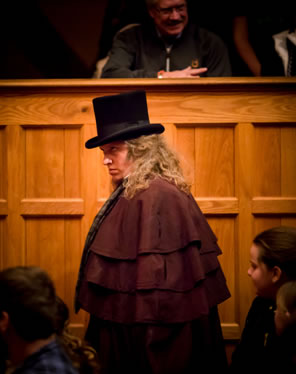
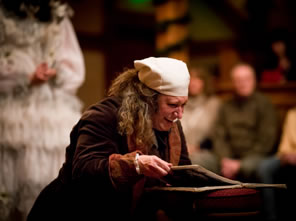
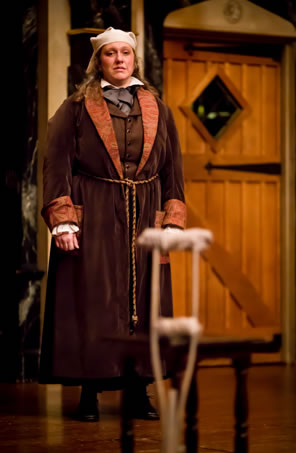
Allison Glenzer plays the many faces of Scrooge in the American Shakespeare Center's annual production of Charles Dickens' A Christmas Carol at the Blackfriars Playhouse: she makes a miserly entrance (top), she has a moment of redemption (middle) and a moment of regret (bottom). Photos by Lindsey Walters, American Shakespeare Center.
"Out of my way!" Ebenezer Scrooge roars. At me.
I am in my row C seat in the Blackfriars Playhouse for the American Shakespeare Center's annual production of Charles Dickens' A Christmas Carol. Scrooge makes his first entrance through the audience and then cuts across the stalls, pausing to glare at me before issuing his order. Already scrunched in, I scrunch some more, and he passes with a sweep of his cloak over my head.
This moment matters much for three reasons. One, it establishes a whole-of-theater community atmosphere for this production of Dickens' classic ghost story. There are no walls, fourth or otherwise, between the cast and us, and not only do we share directly in the joy and blessings bestowed upon us all, we intimately share in Scrooge's redemption. Two, it signals the start of a singular Christmas celebration for my wife and I in which not just Dickens' classic tale but the message at its deepest core resonates with tremendous meaning.
Three, as Scrooge is yelling at me, I am looking into the eyes of one of my favorite actors, Allison Glenzer. We specifically came to see her Scrooge, and we left impressed with a multitalented ensemble that used music as well as truth-in-performance to instill in us real holiday cheer.
A woman playing Scrooge. When Glenzer's casting was announced, she heard consternation that a woman would somehow undermine the role. She also heard suggestions that she should turn Ebenezer into Eloise Scrooge or the like. Glenzer flatly denounced the latter idea. However, she worried that the consternation over a woman in the part would take root not because she couldn't carry it off (in fact, many audience members have not realized a woman is playing Scrooge), but that she would automatically fail to do so in the eyes of a traditionalist beholder. Indeed, a Shakespeareances.com reader wrote me with alarm upon learning that a woman would be playing Scrooge, fearing that theaters have gone too politically correct.
This casting, though, has nothing to do with PC and everything to do with talent. The only affirmative action on the part of Director Jim Warren, co-founder and artistic director of the American Shakespeare Center (ASC), is acknowledging that, right now, Glenzer is not only one of the top talents treading the Blackfriars Playhouse's boards, she is one of the most versatile actresses on the planet. She has played characters across the spectrum of roles from comic to tragic, from insanely silly to seriously insane. All that comes into play in a character like Scrooge, who is funny in the degree of his miserable, miserly existence, but also genuinely despicable. Glenzer's Scrooge draws laughs in his impatient exchange with his nephew Fred (Patrick Poole) and his testy greeting to the two fundraisers (Cordell Cole and Tim Sailer): yet, his reply to the two men is shocking, suggesting that the poor have prisons and workhouses enough or should die and "decrease the surplus population"—words that the ensuing spirits throw back in his face—and Scrooge's threatening treatment toward his clerk Bob Cratchit (Josh Innerst) is unnerving in its intensity. As I experienced first-hand, this Scrooge is dangerous in his utter disinterest in other people.
Glenzer, one of the ASC's go-to Shakespearean clowns, does physical comedy well. The Spirit of Christmas Past (Stephanie Holladay Earl) hands Scrooge her magic wand, which begins conducting a choir singing "Carol of the Bells," flinging Scrooge about. Glenzer hands the wand to a little boy sitting on one of the on-stage gallant stools, and after her astonishment that the wand doesn't have the same affect on him, she takes it back and again begins whirling-dervishing about. At Old Fezziwig's Christmas party, the group shifts from a formal waltz to Walk the Moon's hit song "Shut Up and Dance" to get Scrooge and Belle (Zoe Speas) together, and Glenzer's Scrooge, in Victorian nightcap and robe, is thrusting her hands up and hip-shake-hopping across the stage along with the rest of the cast. Glenzer establishes rich chemistry with Andrew Goldwasser playing the Narrator, and the two engage in verbal jousting accompanied by glaring and sideways glances and occasional physical playfulness.
Nevertheless, Glenzer is an astute actress, digging deep into the lines of her characters to find their truths. Mean old Scrooge had me at hello (or, rather, "Out of my way!"), but the real Scrooge emerges with "Why, it's Ali Baba!" when he sees his younger self as a lonely schoolboy reading a book. "It's dear old honest Ali Baba! And Valentine, and his wild brother, Orson!" Glenzer has opened an old book on a table and after scouring over its worlds she takes in a deep scent of the print, inhaling the very ink from the brittle, brown pages. "To hear Scrooge expending all the earnestness of his nature on such subjects, in a most extraordinary voice between laughing and crying, and to see his heightened and excited face, would have been a surprise to his business friends in the city, indeed," wrote Dickens of this moment, a narrative Glenzer captures perfectly. Indeed, it is a surprise to us, and soon, "with a rapidity of transition" (again quoting Dickens in the original), Glenzer's Scrooge grows melancholy, thinking of the boy singing a Christmas carol at his door earlier in the story and now wishing he had not gruffly sent him off with nary a penny.
Scrooge's redemption begins here. It's the first scene of his life that the Spirit of Christmas Past shows him, reflecting on his own lonely childhood. Instead of turning that pain into a perspective on the world, as he had done all his life, Scrooge now sees that pain he knows so well as an empathetic other, and it is with this mindset that he watches the remaining visions of his life, past, present, and future. Dickens, as exemplified in Warren's adaptation and Glenzer's performance, doesn't merely assign timespans to the three spirits; each illuminates Scrooge in a unique perspective: Scrooge's own in the past, through others in the present, and through the indifferent path of fate in the future. Can a man change his perspective? Scrooge has by the time Christmas Past's visit has ended. Can a man change others' perspective? Scrooge wants to by the time Christmas Present (Cole) leaves the stage. Can a man change his fate? That is Scrooge's ultimate question to the Ghost of Christmas Future, forgetting what Marley's Ghost (Chris Bellinger) had told him: "I am here tonight to warn you that you have yet a chance and hope of escaping my fate." Scrooge awakes from his night of visitations without assurance that he can change his fate, but with a faith and proper perspective—learning that, as Marley had told him, mankind is his business—to do so, nonetheless.
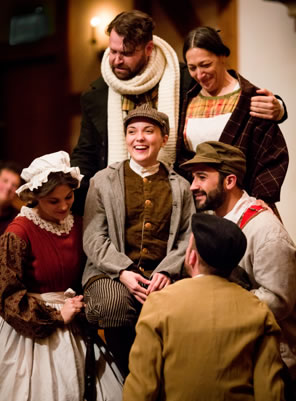
The Cratchit family is blessed with the strength and wisdom of Tiny Tim (Susie Parr, center) in the American Shakespeare Center's production of Charles Dickens' A Christmas Carol. Clockwise from bottom left are Martha (Zoe Speas), Bob Cratchit (Josh Innerst), Mrs. Cratchit (Jessica Lefkow), Ben (Patrick Poole), and Peter (Tim Sailer). Photo by Lindsey Nelson, American Shakespeare Center.
The characters that most understand this are Tiny Tim and his father, Bob Cratchit. In Scrooge's predestined future, however, Cratchit sees his faith undermined by the forces of evil manifested in Scrooge's disinterest in mankind. These can be maudlin scenes in less-skilled hands, but the Cratchit family—Innerst, Jessica Lefkow as Mrs. Cratchit, Poole as Ben, Sailer as Peter, Speas as Martha, and Susie Parr as Tim—make them genuinely bittersweet. Meanwhile, Parr bravely plays Tim with sincere fortitude and genuine compassion, a boy turning a crippling condition into a strength. When Parr speaks the book's most famous line, "God bless us, every one," it resonates with a power to heal.
The three spirits in this production make a profound impression, too. Holladay Earl is a flighty Christmas Past, a Disney princess of a spirit, flouncing around until she zings a poignant revelation that slices through Scrooge's soul. Cole plays Christmas Present as a stud, posing with twinkle in his eye and cocky grin; but when he reveals Ignorance and Want as his foster children, he rattles the roof. No sooner does he exit when the bell tolls and in crawls the faceless spirit of Christmas Future, cloaked in black, hunched over and seeming to walk on four or more legs. When Scrooge addresses him, the spirit rises to his full height, nine feet or more—Patrick Earl is playing the silent specter on stilts, and gasps ripple through the audience.
This production has a fourth spirit (five, counting Marley): that of the Blackfriars Playhouse. The world's only replication of William Shakespeare's indoor theater, the intimate space puts the audience in close, surrounding proximity to the actors. We become part of Scrooge's journey, part of the visions that lead him to salvation. The cast build this mood through engaging, in character, directly with the audience and through music. This ensemble, much of it comprised of the ASC's touring troupe, is musically talented on a multitude of instruments, and Parr in particular has the vocal chops to send a Chicago blues club into rapture. They not only perform Christmas carols but also do a rousing rendition of Nick Lowe's “(What's So Funny 'Bout) Peace, Love, and Understanding” during the intermission, and they close the play with a revival-tent-raising "This Little Light of Mine."
Yet, the spiritual highlight is a moment in Christmas present when the cast begins singing "Have Yourself a Merry Little Christmas." As the rest of the cast sing and Scrooge watches, Goldwasser's Narrator passes along the gallant stools and front row of the stalls handing out candy canes with a heartfelt "Merry Christmas" to each individual. Contended by some as the saddest Christmas carol in the songbook this side of "Blue Christmas," the song is perfectly placed here, illustrating that Christmas is what you make of it, for yourself and for others. "Keep Christmas in your own way, and let me keep it in mine," Scrooge tells Fred at the beginning of the play. He comes to realize that real magic happens when you share Christmas (except for the last, the spirits instruct Scrooge to touch them so that they may safely transport him through time).
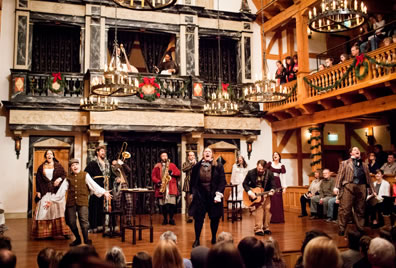
The cast of the American Shakespeare Center's presentation of Charles Dickens' A Christmas Carol perform "This Little Light of Mine" as the production's finale in the Blackfriars Playhouse. From left, Jessica Lefkow, Susie Parr, Cordell Cole, Patrick Poole, Chris Bellinger, Tim Sailer, Allison Glenzer, Stephanie Holladay Earl, Josh Innerst, Zoe Speas, Andrew Goldwasser; above, Chris Johnston and Aleca Piper. Photo by Lindsey Nelson, American Shakespeare Center.
Sarah and I were not keeping Christmas this year, or, at most, we figured on having a merry little Christmas. We love the holiday: celebrating it is one of our passions. But with her cancer treatments (she's now clear) and her heart issues (all resolved) and my current editing assignment keeping me at my desk seven days a week (still ongoing), we decided to forego the time-consuming decorating and our usual celebrations (except I did bake cookies). We also decided to spend Christmas with my ailing father. Sarah and I grew up in the Air Force, and typical of many military families, we didn't "go home" for Christmas. We grew accustomed to spending Christmas at our own home. So, this is the first time I've spent Christmas Eve, Christmas Day, and Boxing Day with my dad in 34 years. He is 87 years old, six years on from a debilitating major stroke, and now suffering the lingering effects of pneumonia.
My dad loves A Christmas Carol. He received a copy of Dickens' Christmas Stories inscribed to him in 1939 (he would have been 11); I borrowed that spine-broken edition from him yesterday to guide me in writing this review. From at least the first Christmas I remember he would read A Christmas Carol to my brothers and me, one section a night, as we sat around the Christmas tree. Even after we left home as adults, dad reread the story every Christmas until the past few years when the effects of his stroke made reading too difficult for him. He has collected every filmed version of the story on DVD (at least 15, he estimates), and he watches those every year. Dad was an Air Force chaplain who, upon his retirement, became a physician assistant for a psychiatric practice. Mankind has always been his business; perhaps as much as spiritual guidance he gained annual affirmation for his humanist spirit through A Christmas Carol. And we always said of him that he knew how to keep Christmas well—my brothers and I carry with us deep-seeded wonderful memories of Christmases past filled with love and joy thanks to the selfless giving of our mom and dad. Christmas is in my DNA.
Coming out of the Blackfriars and readying for five more hours of driving to reach my dad (on top of the three to reach the Blackfriars), I was flushed with the spirit of Christmases. Not celebrate the holiday? I say bah, humbug! to that notion.
May the blessings of the holiday find you, this day and every day, past, present, and future.
Eric Minton
December 25, 2015
Comment: e-mail editorial@shakespeareances.com
Start a discussion in the Bardroom



 Find additional Shakespeareances
Find additional Shakespeareances